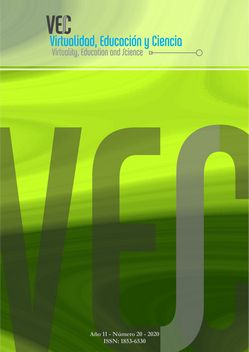Digital technologies in primary school: teachers' perspectives on their inclusion and classroom teaching
DOI:
https://doi.org/10.60020/1853-6530.v11.n20.27434Keywords:
ICT; primary education; teacher perspectives; ICT Project.Abstract
This study aims to analyze primary school teacher´s perspectives on the educational processes mediated by digital technologies and their inclusion in the classroom. For this, a qualitative study is conducted based on the strategies of the Grounded Theory. Based on this approach, different categories and properties are recognized in teacher discourse on digital technologies: ICT vision, which includes the modern or instrumental vision, the non-prescriptive vision and the vision in digital culture; technological resources, which include access, ICT infrastructure and teacher training; and ways of usage, which include different uses as an audiovisual tool, search for information, spaces for knowledge production and exchange (Blogs / Social Networks), programs and applications. The main conclusion is the need to overcome the vision in which teacher represents the only factor in the teaching process mediated by digital technologies, and to consider this process as a part of a broader project promoted by the State towards the diversity of educational communities.
References
AMEIGEIRAS, A. (2006). El abordaje etnográfico en la investigación social, en Vasilachis de Gialdino, I. Estrategias de investigación cualitativa. Buenos Aires: Gedisa, pp. 107-151.
CABELLO, R. (2006). Yo con la computadora no tengo nada que ver: Un estudio de las relaciones entre los maestros y las tecnologías informáticas en la enseñanza. Buenos Aires: Prometeo.
DIKER, G. & TERIGI, F. (2003). Formación de maestros y profesores: Hoja de ruta. Buenos Aires: Paidós.
DUSSEL, I. (2012). La formación docente y la cultura digital: métodos y saberes en una nueva época, en Birgin, A. Más allá de la capacitación. Debates acerca de la formación de los docentes en ejercicio. Buenos Aires: Paidós, pp. 203-232.
DUSSEL, I. y SOUTWELL, M. (2013). La escuela y las nuevas alfabetizaciones. Lenguajes en plural. Revista El Monitor de la Educación, 13. Buenos Aires: Ministerio de Educación de la Nación.
LEVIS, D. (2007). Aprender y enseñar hoy: el desafío informático, Revista Novedades Educativas, 203.
LITWIN, E. (2005). De caminos, puentes y atajos: el lugar de la tecnología en la enseñanza. Conferencia Inaugural realizada en el Segundo Congreso Iberoamericano de EducaRed “Educación y Nuevas Tecnologías”. Recuperado de: http://www.educared.org.ar/congreso/edith_disertacion.asp
LUGO, T. Y KELLY, V. (2011) La matriz TIC. Una herramienta para planificar las Tecnologías de la Información y la Comunicación en las instituciones educativas. Buenos Aires: Instituto Internacional de Planeamiento de la Educación IIPE-Unesco.
MAGGIO, M. (2012). Enriquecer la enseñanza. Los ambientes con alta disposición tecnológica como oportunidad. Buenos Aires: Editorial Paidós.
TAYLOR S.J. y BOGDAN. R. (1994) Introducción a los métodos cualitativos de investigación. Barcelona, España: Paidós.
VASILACHIS DE GIALDINO, I. (coord.) (2006). Estrategias de una investigación cualitativa. Buenos Aires: Editorial Gedisa.
Downloads
Published
Issue
Section
License
The generation of derivative works is allowed as long as it is not done for commercial purposes. The original work may not be used for commercial purposes.


